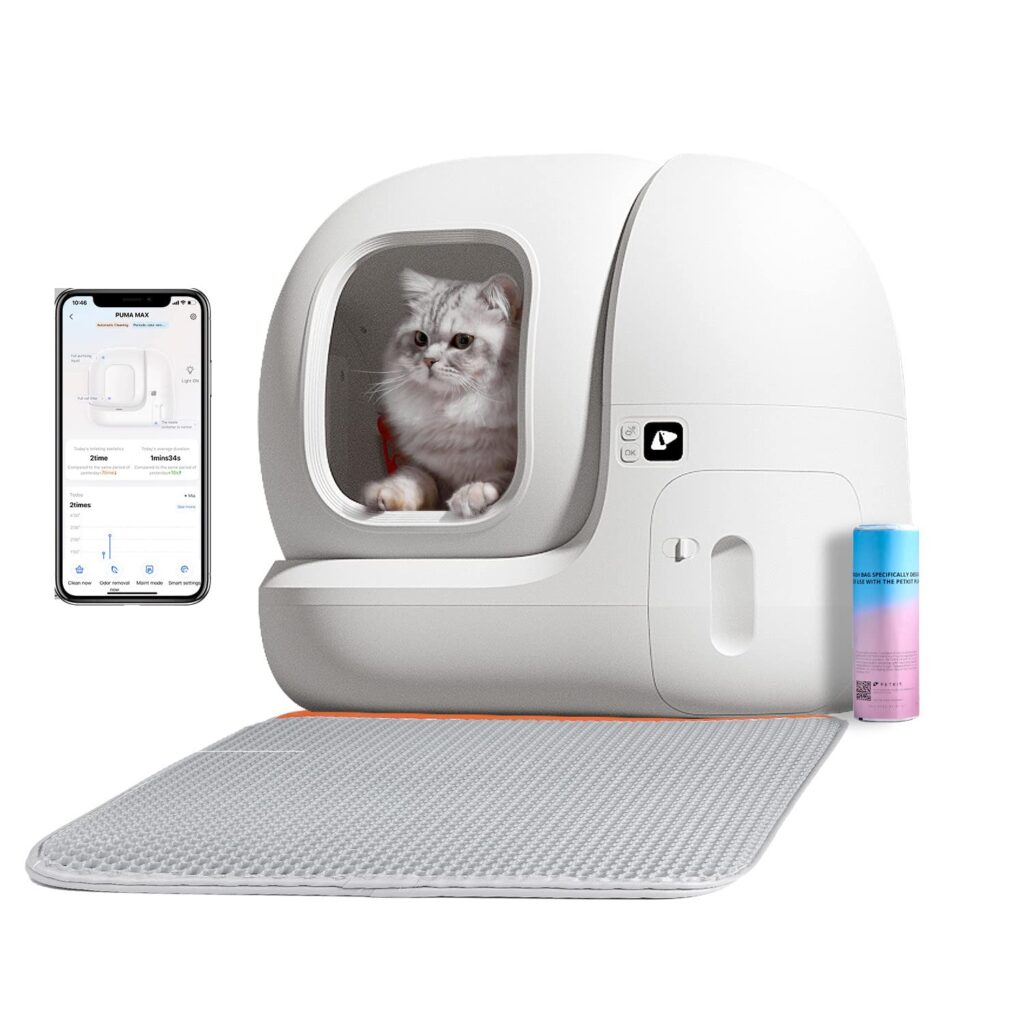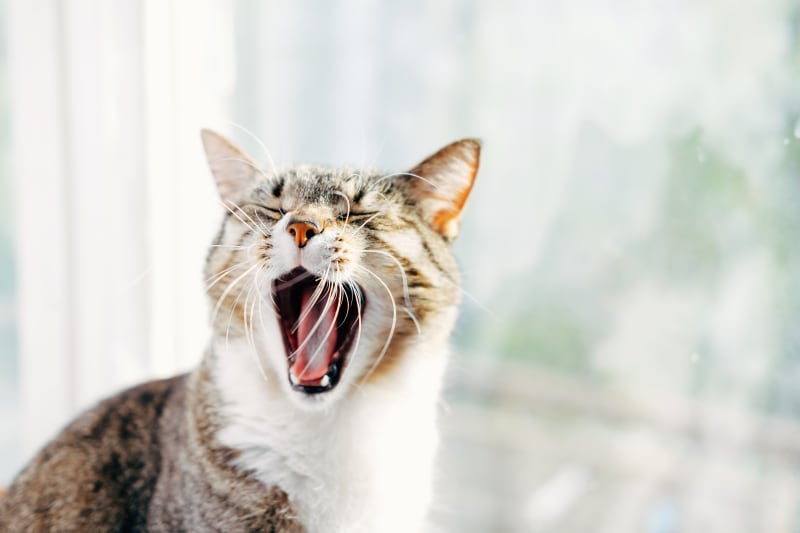A swollen lip in cats can occur due to various reasons. Here, we discuss 9 possible causes.
Swollen lips in cats can occur due to a variety of reasons. Understanding the underlying causes of this condition is important in order to provide the necessary care and treatment for your feline companion. We will explore 9 common factors that can contribute to a swollen lip in cats, giving you a better understanding of what could be causing your cat’s discomfort.
By identifying the root cause, you can take appropriate measures to help alleviate the swelling and ensure your cat’s well-being.

Credit: www.reddit.com
Contents
- 1 1. Allergic Reactions
- 2 2. Insect Bites And Stings
- 3 3. Dental Problems
- 4 4. Lip Injuries And Trauma
- 5 5. Infections
- 6 6. Tumors And Cysts
- 7 7. Oral Ulcers
- 8 8. Lip Inflammation
- 9 9. Autoimmune Disorders
- 10 Frequently Asked Questions For Does Your Cat Have A Swollen Lip? 9 Reasons Why It Happens
- 11 Conclusion
1. Allergic Reactions
Swollen lips in cats can be a cause for concern, but there are several reasons why it may happen. One common cause is allergic reactions. Certain allergens can trigger lip swelling in cats. Common allergens include certain foods, insect bites, or environmental factors such as pollen or dust. It is important to identify if your cat has allergies in order to address the issue. Watch for symptoms such as itching, sneezing, or difficulty breathing, in addition to lip swelling.
If you suspect allergies, consult with your veterinarian. They can help determine the specific allergen causing the swelling and suggest appropriate treatment options. In the meantime, there are steps you can take to alleviate allergies and reduce lip swelling. This may involve removing potential allergens from your cat’s environment, providing a hypoallergenic diet, or using medications to manage symptoms. It’s important to follow your vet’s guidance to ensure the best outcome for your furry friend.
2. Insect Bites And Stings
Insect bites and stings can be a common cause of swollen lips in cats. Various types of insects can cause this allergic reaction in our feline friends. Bees, wasps, hornets, and ants are some of the common insects that can inflict a bite or sting on cats, leading to lip swelling.
The presence of lip swelling is a key symptom to watch out for if you suspect your cat has been bitten or stung by an insect. Other signs include redness, pain, itching, and possible development of a small bump or lesion on the affected area.
To relieve the discomfort caused by insect bites or stings, effective remedies can be applied. Applying a cold compress to the affected area can help reduce swelling. Over-the-counter antihistamines can be used as well to alleviate itching and inflammation. However, it is important to consult your veterinarian before administering any medications to ensure they are safe for your cat.
3. Dental Problems
One of the possible reasons for a swollen lip in cats is dental problems. Dental conditions such as periodontal disease, tooth abscesses, or other oral infections can lead to lip swelling. It is important to pay attention to signs that indicate your cat is experiencing dental issues, such as bad breath, difficulty eating, drooling, or pawing at the mouth.
To prevent lip swelling due to dental problems, proper dental care is essential. Regular brushing of your cat’s teeth can help remove plaque and prevent the accumulation of bacteria. Additionally, providing dental treats or toys that promote chewing can contribute to good oral health. Scheduling regular veterinary check-ups and professional dental cleanings is also recommended to ensure your cat’s dental hygiene.
| Dental Care Tips to Prevent Lip Swelling |
|---|
| 1. Brush your cat’s teeth regularly with a pet-safe toothbrush and toothpaste. |
| 2. Use dental treats or toys that promote chewing to help remove plaque. |
| 3. Schedule regular veterinary check-ups and professional dental cleanings. |
4. Lip Injuries And Trauma
When a cat has a swollen lip, it could be due to various reasons, including lip injuries and trauma. Common causes of lip injuries in cats include bites, scratches, or even accidents. Signs and symptoms of a lip injury may include swelling, redness, pain, bleeding, or difficulty eating or grooming. If a cat experiences a lip injury, it is essential to seek veterinary care for a proper diagnosis and treatment.
Treatment options for healing and reducing lip swelling may include cleaning the affected area, providing antibiotics or pain medication, and possibly sutures or surgical intervention in severe cases. Additionally, applying a cold compress or ice pack wrapped in a cloth can help reduce swelling and provide some relief. It is important to follow the veterinarian’s recommendations and monitor the cat’s progress during the healing process.
| Common causes of lip injuries in cats: |
| Bites |
| Scratches |
| Accidents |
- Swelling
- Redness
- Pain
- Bleeding
- Difficulty eating or grooming
Treatment options for healing and reducing lip swelling:
- Cleaning the affected area
- Providing antibiotics or pain medication
- Sutures or surgical intervention (in severe cases)
- Applying a cold compress or ice pack wrapped in a cloth
5. Infections
Infections can be a common cause of swollen lips in cats. There are various types of infections that can lead to lip swelling, including oral infections, bacterial infections, and fungal infections. Pet owners should familiarize themselves with the signs of an infected lip, such as redness, swelling, discharge, and a foul odor. If you notice these signs, it is important to seek appropriate veterinary treatment as soon as possible. Treatment options may include antibiotics, antifungal medications, or other treatments depending on the underlying cause of the infection. It is crucial to address infections promptly to prevent further complications and discomfort for your furry friend.
6. Tumors And Cysts
Swollen lips in cats can be caused by a variety of reasons, and tumors and cysts are one possible cause. There are various types of tumors and cysts that can affect a cat’s lips. These growths can develop due to genetic factors, environmental factors, or a combination of both.
It is important to be aware of the warning signs of a tumor or cyst on your cat’s lip, such as persistent swelling, a lump or bump, bleeding or ulceration, and difficulty eating or grooming. If you notice any of these symptoms, it is crucial to consult a veterinarian for proper diagnosis and treatment.
The diagnostic process for lip growths in cats typically involves a physical examination, a biopsy to determine if the growth is benign or malignant, and possibly imaging tests to assess the extent of the growth. Treatment options depend on the type and severity of the tumor or cyst, and may include surgical removal, medication, or other specialized procedures.
7. Oral Ulcers
Oral ulcers in cats can often lead to a swollen lip. These ulcers can be caused by a variety of factors, including dental disease, viral or bacterial infections, trauma, or even certain autoimmune disorders. Identifying the signs of oral ulcers in cats is crucial in order to seek proper treatment. Look out for symptoms such as drooling, bad breath, difficulty eating, or pawing at the mouth.
To help promote healing, it is important to provide your cat with appropriate treatment options. This may include pain medication, antibiotics for infection, or topical treatments to soothe the ulcers. Additionally, ensuring your cat maintains good oral hygiene and receives regular dental check-ups can help prevent the development of oral ulcers.
| Causes of oral ulcers: | Impact on the lips: |
|---|---|
| 1. Dental disease | Can cause inflammation and ulceration |
| 2. Viral or bacterial infections | Can lead to development of painful ulcers |
| 3. Trauma | May result in lip swelling and ulcer formation |
| 4. Autoimmune disorders | Can cause chronic ulcers and lip swelling |
8. Lip Inflammation
Lip inflammation in cats can occur due to various factors, leading to discomfort and concern for their owners. Understanding the contributing factors and recognizing the signs and symptoms of this condition is essential to address the issue promptly.
Factors Contributing To Lip Inflammation In Cats
There are several factors that can contribute to lip inflammation in cats, including:
| Allergies | Infections |
|---|---|
| Cat may show allergic reactions to certain foods, insect bites, or environmental allergens. | Bacterial or fungal infections can cause lip inflammation in cats. |
| Injuries or Trauma | Oral Health Issues |
| Accidents or fights can lead to swelling and inflammation of the cat’s lip. | Poor dental hygiene can result in gum disease and lip inflammation. |
Signs And Symptoms Of Lip Inflammation
Cats with lip inflammation may exhibit the following signs and symptoms:
- Swollen or puffy lip
- Redness and irritation
- Excessive drooling or foaming at the mouth
- Pain or discomfort
Methods To Soothe And Reduce Lip Inflammation
To provide relief and reduce lip inflammation in cats, consider the following:
- Consult a veterinarian for an accurate diagnosis and appropriate treatment.
- Administer prescribed medications such as anti-inflammatory drugs or antibiotics.
- Apply recommended ointments or gels to soothe the inflamed area.
- Keep the cat’s living environment clean to prevent further irritations.
- Provide a balanced diet and ensure proper oral hygiene.
9. Autoimmune Disorders
Autoimmune disorders can affect a cat’s lip and result in swelling. These disorders occur when the immune system mistakenly attacks healthy cells in the body. An overview of autoimmune disorders affecting cat lips helps identify the symptoms and manage the condition effectively.
Recognizing the symptoms of an autoimmune condition is crucial for early detection and treatment. Cats with swollen lips may also show signs of pain, redness, or discharge. Veterinary attention should be sought immediately if these symptoms arise.
Therapeutic approaches are available to manage and minimize lip swelling associated with autoimmune disorders. These may include anti-inflammatory medications, immunosuppressive drugs, or dietary changes. It is essential to work closely with a veterinarian to develop an individualized treatment plan for the cat.
Frequently Asked Questions For Does Your Cat Have A Swollen Lip? 9 Reasons Why It Happens
What Causes Cat Lips To Swell?
Cat lips can swell due to various reasons, including allergies, insect bites, oral infections, or injuries. It’s essential to consult a veterinarian for an accurate diagnosis and appropriate treatment for your cat’s swollen lips.
Can Cat Allergies Cause Lip Swelling?
Yes, cat allergies can cause lip swelling.
Why Does My Cat Have A Big Bump On Her Lip?
A big bump on your cat’s lip could be due to an abscess or an allergic reaction. Take your cat to a vet for a proper diagnosis and treatment.
How Long Does It Take For A Swollen Lip To Go Down?
A swollen lip usually takes around 3 to 7 days to go down. However, the exact time can vary depending on the cause and severity of the swelling. It is best to treat the swelling with cold compresses and avoid irritants to speed up the healing process.
Conclusion
Having a swollen lip can be concerning for any cat owner, but understanding the reasons behind it is crucial. From allergic reactions to infections, there are several factors that can contribute to a cat’s swollen lip. By paying attention to their behavior and seeking veterinary care when needed, you can ensure your furry friend receives the necessary treatment.
Remember, the key to addressing a swollen lip in cats is early intervention and proper diagnosis. Stay vigilant and keep your feline friend healthy and happy.

Katie Lindsey is a passionate cat lover and founder of Cats Solution, a comprehensive resource for all things feline. With a lifelong love for cats and extensive knowledge in their care and behavior, she provides expert advice and solutions to cat owners. Through her website, Katie fosters a supportive community where cat enthusiasts can find guidance and heartwarming stories. A dedicated advocate for animal welfare, Katie also promotes responsible pet ownership and adoption. Join her on this purr-fect journey celebrating the joy of feline companionship.



